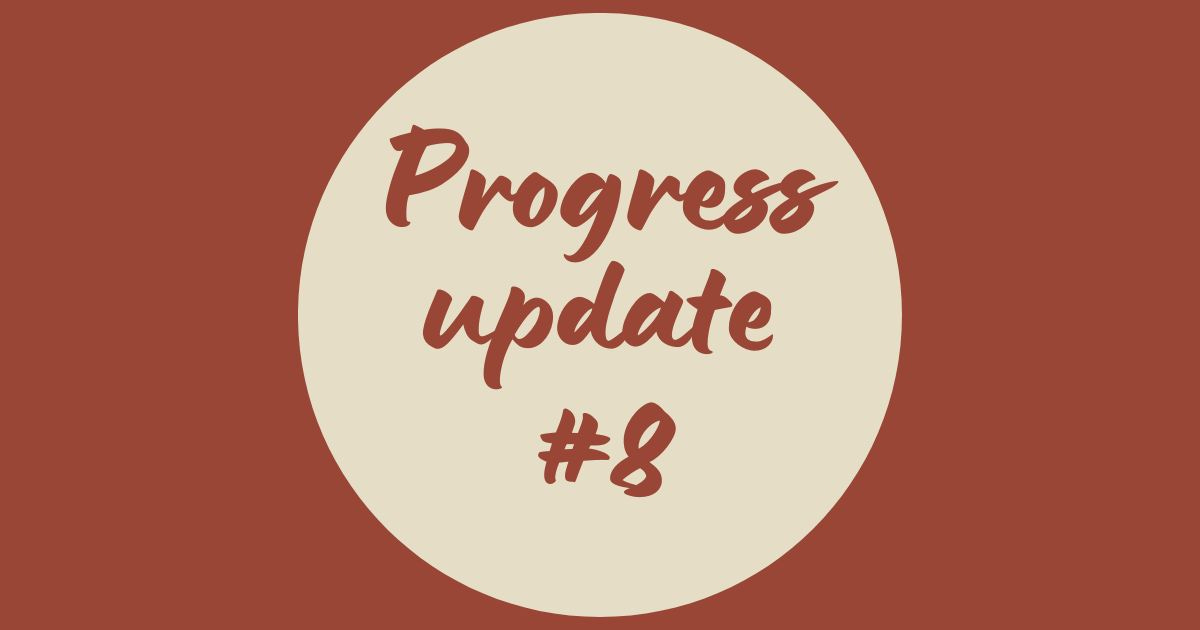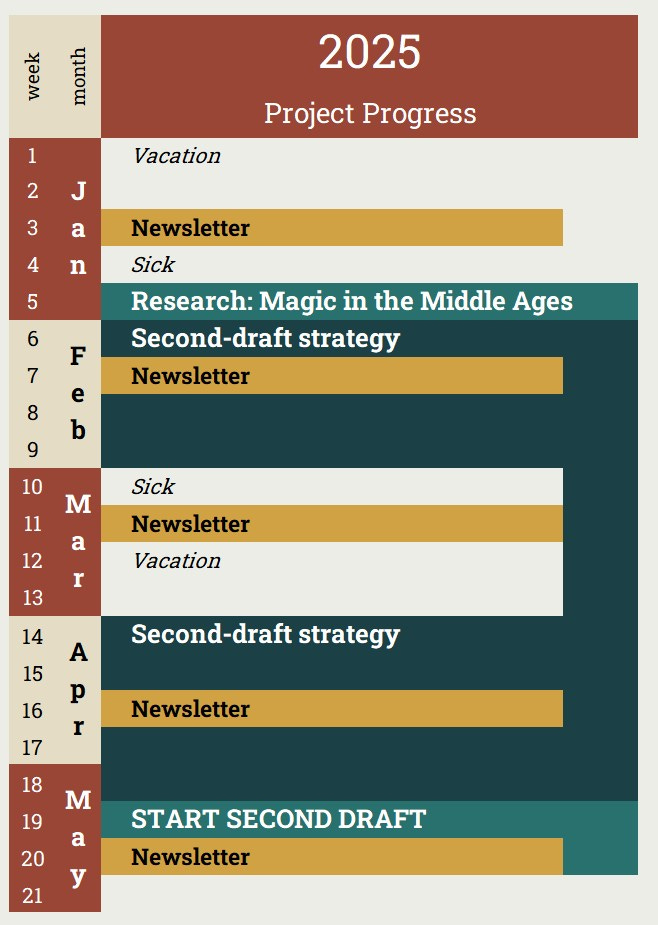The rewrite has begun
On realizing I'll never be ready, using the Snowflake Method, and finding fun in writing
Hey there!
Every once in a while, I’ll update you on my progress: it’ll help me keep myself accountable and reflect on how my projects are going, while also being a (hopefully) interesting behind-the-scenes peek for you.
🗓️ Weekly rotation
I dedicate every week to a different project, following this order:
Week 1: ✍🏼 Rewrite
Week 2: 📫 Newsletter
Week 3: ✍🏼 Rewrite
Week 4: 📚 Research/Self-study
[You can find more details about this schedule in the entry How to schedule time as a part-time writer.]
✍🏼The rewrite
THE REWRITE HAS BEGUN.
I’ve finally started to actually write the freaking second draft.
I managed to put aside the research, open up a new empty document, stare at it intently for a while, and finally type the first words.
Now, now, the word count is at a meager 480 (I’m writing this post a few weeks before it’ll be published, so hopefully it’ll be a tad more than that by now)—but still, I’m proud. I’ve been thinking for years that I need to start writing the second draft of my novel, so much so that it has become a hurdle in my head. Finally, I’ve jumped over it (just to discover that it’s the first one of a long, long, long line, but I’ll get to that later).
Does this mean that I have all the research done and ready, the outline pinned down, and an exact idea of how the story will go?
Hell no.
I had already realized that it’s simply not feasible to have the entirety of my worldbuilding and plot research done before starting to write, unless I want to wait for another 10 years. I knew it, but I still hesitated, feeling that I was not ready yet—feeling that I still needed to get at least some more elements clear before starting, or I’d end up with a draft that needed to be completely redone, again.
So, I set myself the deadline to start writing in May. May rolls around, and I still don’t feel “ready”.
It’s so silly—I’ve done this already. I’ve written a whole draft. I know that at some point you've got to put aside what is stopping you from writing and just, well, write.
It took me some more encouraging words from my writer friends… and getting lost for a whole morning researching how noble titles work and how to address nobility (it’s fascinating, really. Did you know that there’s a difference if you call someone “Lady + first name” or “Lady + last name”? The daughters of Dukes, Marquesses, and Earls are informally and verbally addressed as Lady + first name—for example, Lady Mary. But if they marry someone with a title, then they become Lady + title name—so the wife of the Earl of Grantham is Lady Grantham1).
I researched noble titles for hours, only to realize that I don’t need them for my story, so I went and ditched the whole thing. I decided I’ll do myself a favor if I stick to researching the things I need specifically for the chapters I’m working on.
And, well, I sat down, wondered what I needed to write the prologue, and concluded that I know enough of what’s supposed to happen in there that I could just start writing. So that’s what I did.
To be fair, compared to how I started the first draft, I have such a clearer idea of what my story is about.
I’ve been scared to repeat the same mistakes I’ve made before (which, I want to point out, I don’t regret2), which has made me hesitant to go and start writing—but on the other hand, it also brought me to do some really good thinking about my story.
In the last few weeks I ended up dabbling with a method of which I had heard a lot about, but never really gotten into, until now: the Snowflake Method.
The Snowflake Method by Randy Ingermanson
I’m not going to explain every single step in detail, but if you’re interested I highly recommend giving a read to the original post.
The concept of the snowflake method is that it’ll help you to gain clarity about your book if you start by pinpointing the very basic idea of your story, and if you then slowly build up from that.
Just to give you an idea, these are the first few steps (yep, it’s a step-by-step process):
1. Write a one-sentence summary of your novel
The fewer words, the better: Ingermanson, the creator of the method, recommends keeping it under 15 words. This is the big picture, the “elevator pitch” for your story, that you then go and expand in the following step:
2. Expand the sentence to a full paragraph “describing the story setup, major disasters, and ending of the novel”
Each sentence of the paragraph is supposed to encapsulate one act of the story. Ingermanson likes to structure a story as “three disasters plus an ending”, but you can adopt any story structure you prefer.
3. Write a one-page summary sheet for each of your major characters
Ingermanson lists some useful questions: they are not simply about the character’s name and hair color, but things like, “What’s the character’s motivation (what do they want abstractly)?”, or, “What’s the character’s epiphany (what will they learn, how will they change)?”.
4. Expand the paragraph-long summary of your story
The idea being, you can expand each single sentence that encapsulates an act of the story into full paragraphs.
I’ll stop listing them here, but there are a few more steps (10 in total).
I have to admit, I haven’t done all of them: I kinda stopped at step nr 3, on one side because I’m lazy, but also… I got so much by doing these few steps already, I felt like I already had gotten a lot out of the process and didn’t “need” to do the rest to get started with the story.
(Pretty sure that it would have been useful to complete the steps, but oh well.)
Step 3 was especially useful: it allowed me to observe the story from the point of view of the main characters involved. It helped me pinpoint some weaker points of the plot, and no joke, it brought me to a couple of breakthroughs and helped me piece together what needed to happen in some parts of the story.
Still, an outline is only an outline, and part of its job is to be changed. That’s the thing: I don’t have to come up with a perfect story in my head already, I’ll discover part of the story as I’m writing. It’s good to have an idea of where this is going, but I cannot plan everything. At least, I concluded that I can’t.
I had a moment right before starting to write the prologue—I was working on one of those character sheets of step three—when I lifted my eyes from my laptop’s screen and paused and asked myself, “Why am I doing this again?”
Writing isn’t just a hobby for me, even though it is something that I do completely in my free time. With that, I mean that writing isn’t one of those activities that I do to relax—I don’t gravitate towards it naturally. I actually kind of have to nudge myself in that direction. It’s a project: it’s a long-term thing I’m working on because I’ve realized that working on something mine gives me purpose.
Sometimes writing feels like work, and it especially felt like work in that moment when I lifted my eyes and saw all the way I still had to go to have something completed in my hands: goddamnit, I was just preparing to start and hadn’t started yet and I know how much work still awaits me (and it’s probably more than what I think it’ll be).
But… It’s not enough of a reason not to do it. Not yet, at least.
You can imagine now how relieved I was when I noticed, once I started to write, that I was having fun.
That day I started writing the prologue? It was a one writing session of less than 500 words, but I was oh so happy afterwards, I was soaring the rest of the day 🤣3 I was thinking on how to conclude the prologue and how to write the next chapter and what foreshadowing I needed to do and…
It was fun thinking about it.
You’d think that because I’m a writer I should love writing. I don’t know, for me it’s a more complex relationship than that 😂
I’ll keep those feelings in check… but maybe, maybe I’ll be fine.
If you have any thoughts on what I shared, let me know by simply replying to this email, writing me at ryeyoubs@gmail.com, or leaving a comment!
Take care,
Rye Youbs
Everything on Rye & Writing is currently free—nothing is behind a paywall. But if you like what I’m doing and you’d like to support me, feel free to drop a little donation. You’ll have my eternal gratitude!
See also
On the different ways to address a Lady — does it sound complicated? Imagine trying to put together this info. I’m still not sure if I’m right! I’ve been scouring the internet for hours, going through sites, Reddit posts, and Quora answers. If the topic interests you, A guide to the noble titles of medieval Europe for writers offers a detailed yet manageable overview, while The Trouble with Titles can give you an idea of what a headache this topic can be.
On the mistakes of the first draft I don’t regret — I started writing the first draft with only a vague idea of what was going to happen in the story (I go deeper into it in How I wrote the first draft of my novel) and no research at all… but I needed to go about it that way. At that time, I was training myself to write consistently—fixing the story into something well built was going to be a whole other skill to train that would have overwhelmed me at that time.
On being happy for the rest of the day after a good writing session — writing can be fun sometimes, but most of the time “I like having written”.










Interesting method, and even more interesting how you deal with it (or rather, how you cultivate your relationship with writing). I can't help but wish you strength, courage, and luck (that's also part of it, right?)!
This method sounds so complex, so I commend you for tackling it! I like the idea of pinpointing the core of your story with a few words. Lately, I've discovered that when I set out to write a short story or novella, I'm able to more quickly and more cleanly structure the plot. As I write though, the story expands until the final work ends up being longer than the one I originally set out to write. For example, the last short story I tried to write expanded into a novella, and the last novella I tried to write expanded into a short novel. The original structure I started with, however, forced me to structure the plot's events in a succinct way while also giving me room to expand the worldbuilding and scenes between characters. Best of luck with your writing as always!